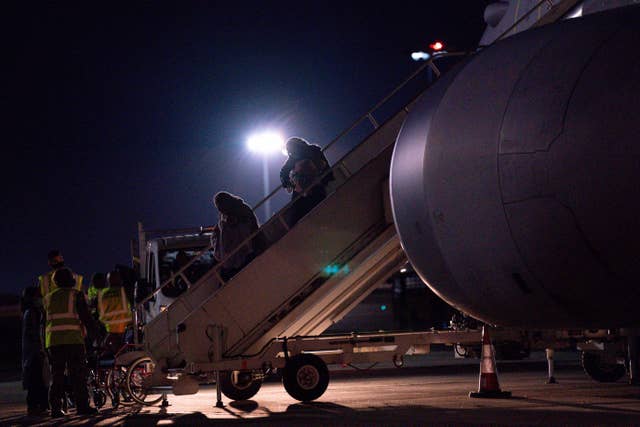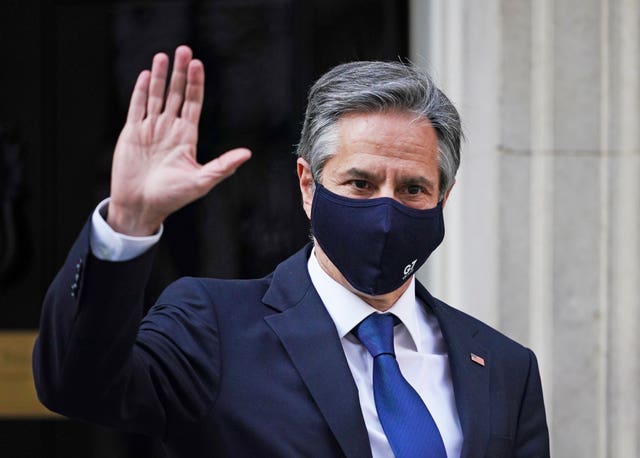
An explosion has been heard outside Kabul airport following warnings that a terror attack could be launched in the final phases of the evacuation effort.
US defence spokesman John Kirby confirmed the blast occurred and said “casualties are unclear at this time” on Thursday afternoon.
It came after armed forces minister James Heappey previously warned there is “very credible reporting” of an “imminent” and “severe” threat to Kabul airport.
US Pentagon spokesman John Kirby has now confirmed there had been at least two explosions in Kabul.
In a tweet, he said: “We can confirm that the explosion at the Abbey Gate was the result of a complex attack that resulted in a number of US & civilian casualties.
“We can also confirm at least one other explosion at or near the Baron Hotel, a short distance from Abbey Gate. We will continue to update.”
An emergency hospital in Kabul says more than 30 people have been injured in two explosions near Kabul airport.
We can confirm that the explosion at the Abbey Gate was the result of a complex attack that resulted in a number of US & civilian casualties. We can also confirm at least one other explosion at or near the Baron Hotel, a short distance from Abbey Gate. We will continue to update.
— John Kirby (@PentagonPresSec) August 26, 2021
Officials do not think at this stage there were any UK casualties, military or civilian, in the incident in Kabul and believe there were two explosions.
A British defence source told Sky News that it is "highly likely" Islamic Stat Khorasan, also known as ISIS-K, is responsible for the attacks.
Here, the PA news agency looks at the group and its role in Afghanistan.
Who are Isis-K?
Founded in 2015, Isis-K is the branch of the so-called Islamic State in the Khorasan region, which historically covers parts of Iran, Afghanistan and Pakistan.
It was formed initially by militants from Pakistan along with disaffected Taliban members and operates mainly in the north and east of Afghanistan, close to Kabul.
A recent UN Security Council report suggested there were between 1,000 and 2,200 Isis-K fighters, down from a peak of between 5,000 and 6,000 in 2016, but their ranks may have been swelled in recent weeks as the Taliban’s advance saw prisoners freed across the country.
 A Taliban fighter stands guard at a checkpoint in Kabul, Afghanistan (Khwaja Tawfiq Sediqi/AP)
A Taliban fighter stands guard at a checkpoint in Kabul, Afghanistan (Khwaja Tawfiq Sediqi/AP)
What is Isis-K’s relationship with the Taliban and al Qaida?
Isis-K is hostile towards the Taliban due to its more extreme version of Islam and the two groups have previously fought over control of territory in Afghanistan.
After the Taliban’s takeover of the country last week, the group reportedly executed a senior Isis-K commander who had been imprisoned in Kabul.
The conflict between the two groups means that Isis-K is less likely to be bound by the Taliban’s agreement with Western forces to allow evacuations to continue from Kabul airport.
Similarly, the relationship between Isis-K and al Qaida is unlikely to be one of straightforward co-operation despite their similar beliefs, reflecting broader conflict between al Qaida and IS globally.
 British nationals and Afghan evacuees depart a flight from Afghanistan at RAF Brize Norton (Jacob King/PA)
British nationals and Afghan evacuees depart a flight from Afghanistan at RAF Brize Norton (Jacob King/PA)
What is the threat from Isis-K?
Isis-K has carried out a number of high-profile attacks in recent years, despite reports that its numbers had fallen thanks to military action by the US, Afghan forces and the Taliban.
The group is thought to have carried out a devastating attack on a maternity hospital in Kabul in May 2020, killing 24 people including newborn babies and mothers.
It has also claimed responsibility for several other attacks in Kabul, including an assault on the city’s university last November and rocket attacks in the same month. Isis-K also claimed responsibility for an attack on Jalalabad prison last August.
The group is clearly able to carry out deadly, complex attacks in the area and US secretary of state Antony Blinken described the threat of an Isis-K attack as “a very real possibility”.
 United States secretary of state Antony Blinken has said an attack by Isis-K is ‘a very real possibility’ (Yui Mok/PA)
United States secretary of state Antony Blinken has said an attack by Isis-K is ‘a very real possibility’ (Yui Mok/PA)
But the former head of British forces in the country has said it might not be “the main threat”.
Colonel Richard Kemp told BBC Breakfast on Thursday morning: “That threat of terrorist attack, whether it’s from Taliban, the Islamic State, or al Qaida, it could equally be all three of those groups.
“The fact that people are talking about Islamic State doesn’t make that the most likely threat.”



Comments: Our rules
We want our comments to be a lively and valuable part of our community - a place where readers can debate and engage with the most important local issues. The ability to comment on our stories is a privilege, not a right, however, and that privilege may be withdrawn if it is abused or misused.
Please report any comments that break our rules.
Read the rules here